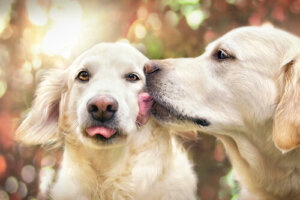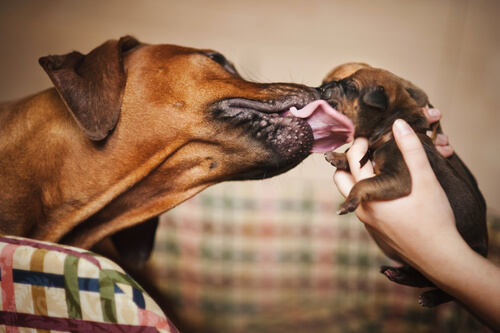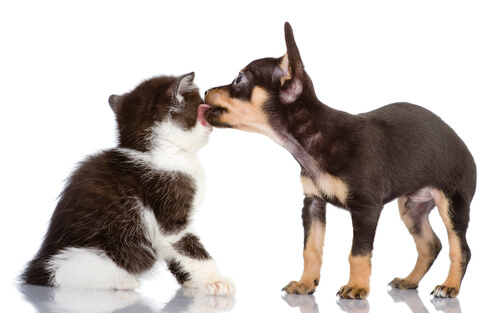Why Do Some Dogs Obsessively Lick Other Dogs?


Written and verified by the biologist Ana Díaz Maqueda
Many dog owners wonder why their dogs lick other dogs or why they do it so compulsively. Is this normal? Should I let my pet lick other dogs?
In this article, we’ll delve into this behavior that’s so common in dogs, licking. We’ll learn whether or not it’s a normal behavior. And, if it is, at what point does it stop being normal and give way to an obsessive behavior?
Communication between dogs
Dogs are sentient animals with a high capacity for reasoning. They’re also social beings that live in groups. For this reason, dogs have a wide range of behaviors that serve to express the different emotions that can occur throughout the day or throughout their lives.
For humans, certain behaviors that dogs have can be negative. For example, if a dog growls at another dog when it approaches, we try to correct it or remove it from the situation. However, its growling communicates to the other dog that it doesn’t want to be bothered. If the other dog knows how to communicate, it’ll respond with a calm signal, like any of these:
- Muzzle licking
- Licking the growling dog
- Looking away
- Turning and walking away
- Yawning
- Showing its belly

For a dog to learn how to communicate, it doesn’t need to have met hundreds of dogs of different breeds, ages, or sexes. Simply having spent some time with one or two other dogs that communicate well is enough. It’s very important to expose the dog to others of their own kind during the first 12 weeks of life, as this is when the socialization period takes place.
This means that quality is better than quantity. For example, there are dogs that haven’t received any type of education from humans and communicate perfectly with their own kind.
Some dogs have problems communicating with other dogs for different reasons, such as fear, reactivity, lack of self-control, stress, etc. Each of these problems is solved in a different way, but they all have in common that they need time and a lot of work.
As part of the therapy, working with the animal’s sense of smell, walking in quiet places where the animal can know the environment through its nose, and a good bond and trust with the owner are essential to ensure that the animal is psychologically healthy. Solving a behavior problem in a dog can be difficult and almost always requires the help of an educator.
Dogs that lick other dogs: Is this normal behavior?
Licking in dogs is a completely normal behavior. A dog may lick itself as a form of grooming and self-care. In addition, he may lick other dogs to clean them and strengthen the bond. We can see this clearly when a dog washes her puppies or when two dogs love each other.
At the same time, dogs can lick each other. By doing so, they communicate or get information from each other. For example, there are glands in both the genitals and ears that secrete pheromones. Pheromones are chemical compounds that serve, among other things, to give relevant information to others of the same species. The organ that detects these substances is the vomeronasal organ and is located in the mouth.
Likewise, a dog that licks the mouth of another dog is obtaining information. By licking, it will know what the other dog has eaten and approximately when it ate.
Finally, dogs also lick each other in an attempt to self-soothe or calm the other dog. After a fight or a very tense situation, one dog may lick another. By doing so, it’s telling the other that everything’s all right.
Mothers lick their puppies to strengthen bonds and also to protect their litter from microorganisms. Surprising as it may seem, canine saliva has certain bactericidal properties.
Do I have to intervene when dogs lick other dogs excessively?
There’s no yes or no answer to this question. It all depends on the animal, its state of mind, if it has other problems or if it’s a stable dog, if it knows how to communicate, its age, etc.
Puppies tend to lick more than adult dogs because they don’t know how to relate perfectly yet. On the other hand, dogs that suffer from stress or tend to be very excited also lick more. Unfortunately, this behavior sometimes also indicates the presence of an illness in the dog (such as stereotypies or obsessive-compulsive disorder, among others).
How do I stop my dog from licking other dogs obsessively?
If the act is natural and neither party is bothered, you have nothing to worry about. On the other hand, if one of the dogs is aggressive or hostile towards the dog that’s licking excessively, you may need to take some action.
The first step is simple; move the animal away from the other dog’s body and let it calm down. If that’s not enough, you can use more sophisticated techniques. Here are some more sophisticated techniques:
- Ignore the dog that licks a lot until it stops on its own: Many times, owners reinforce negative behaviors without realizing it. If every time the dog licks another dog excessively, you separate them, talk to them, or play with him, it’ll associate this act with getting attention from its owner. Therefore, unless it’s very chronic, it’s best to ignore the animal.
- Call their attention to something they can bite: If the dog won’t stop licking another dog on its own, you can try to get their attention with a dog chew toy or a special bone for the species. This will direct the licking behavior towards something inert and your pet will enjoy the process.
- Get plenty of exercise with your dog: Sometimes dogs become obsessive when they lack physical and emotional stimulation in the home environment. If you tire your dog out and exercise with it, it’s sure to stop obsessively licking other dogs.

If you think your dog licks others excessively, you must first find the cause. Sometimes it’s a good idea to make an appointment with a dog trainer who can help guide you through the problem. Depending on what’s causing this obsessive behavior in the dog, the treatment will be different.
In any case, if you want to intervene, never scold the dog or use aversive stimuli. It’s better to take it calmly away from the presence of the other dog, entertain it with toys that stimulate its sense of smell or take it for a walk, at first, in areas where there are no other dogs. This behavior can be a bit annoying, but remember that it’s ingrained in the dog’s genome and it doesn’t deserve to be punished for it.
All cited sources were thoroughly reviewed by our team to ensure their quality, reliability, currency, and validity. The bibliography of this article was considered reliable and of academic or scientific accuracy.
- Anzola B. (2016). Trastorno obsesivo compulsivo en un perro. Gaceta de Ciencias Veterinarias, 21(2), 33-37. Recuperado de: https://revistas.uclave.org/index.php/gcv/article/view/827
- Bentosela M., & Mustaca A. E. (2007). Comunicación entre perros domésticos (Canis familiaris) y hombres. Revista Latinoamericana de Psicología, 39(2), 375-387. http://pepsic.bvsalud.org/scielo.php?script=sci_arttext&pid=S0120-05342007000200012
- Mariti, C., Falaschi, C., Zilocchi, M., Fatjó, J., Sighieri, C., Ogi, A., & Gazzano A. (2017). Analysis of the intraspecific visual communication in the domestic dog (Canis familiaris): A pilot study on the case of calming signals. Journal of Veterinary Behavior, 18, 49-55. Recuperado de: https://www.sciencedirect.com/science/article/abs/pii/S1558787816302465
- Rugaas T. (2006). On talking terms with dogs: Calming signals. Dogwise publishing. Recuperado de: https://books.google.com.mx/books
- Rugaas, T., & Ramos, B. P. (2005). El lenguaje de los perros: las señales de calma. Kns ediciones.
- Santos N. R., Beck A., & Fontbonne A. (2020). A review of maternal behaviour in dogs and potential areas for further research. Journal of Small Animal Practice, 61(2), 85-92. Recuperado de: https://onlinelibrary.wiley.com/doi/full/10.1111/jsap.13085
This text is provided for informational purposes only and does not replace consultation with a professional. If in doubt, consult your specialist.